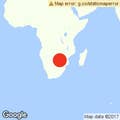JOHANNESBURG, South Africa — On the January day three years ago that Kgomotso Tjie found out he’d made it into an elite South African university, he logged onto his Facebook page and typed a message with shaking hands. The moment he’d worked toward all his life had arrived.
“I thank God for granting me the desires of my heart,” he wrote.
For Tjie, the University of Witwatersrand in Johannesburg was the promised land, evidence that being poor and black was no longer a barrier to success in South Africa. Born in a rural township some 400 miles northeast of Johannesburg, he'd started believing that hard work and smarts really might be enough.
It had been a lonely odyssey to get there. At his all-black high school, more girls get pregnant each year than students make it to university, and guidance from teachers on how to apply to university had been minimal. Stumbling through a stash of application forms alone at a local library, Tjie had been stumped by even the most basic bureaucratic questions. He’d never encountered officious phrases like next of kin. Back home, his mother, who sold vegetables by the roadside to help make ends meet, couldn't offer much practical advice.
Just a quarter of Tjie’s year group at the state-funded M.L. Nkuna High School got the grades required to get into university that year, reflecting the enrolment rate of black students across public schools in the country. Tjie was one of the lucky ones who got the grades and could scrape together the money for fees to actually enrol. But once he got to Wits — as the university is known to students and teachers alike — he found himself plagued as much by self-doubt as financial constraints.
“I never fool myself into thinking because I’m here — because I left most of my peers in townships and villages — I’m a ‘better black.’ The struggle doesn't end just because I made it to Wits,” he said quietly one afternoon at the end of last year, as we sat in a terraced amphitheater overlooking the campus’s Olympic-size pool.
It’s a reality that gets to the heart of a political battle defining this generation of South Africans. Those who came of age in a country unshackled from the white-minority rule known as apartheid have found themselves confronting a painful question. What does it mean to be black in a country that still confers advantages on white people in every walk of life, even now, more than two decades after the end of minority rule?
The first rumblings of a movement that was to sweep across campuses began back in March 2015, when a black student threw a bucket of shit over a statue of Cecil John Rhodes, a proudly racist British imperialist and mining magnate, which looked down over the main square at the University of Cape Town. That act of defiance had an elegant symmetry to it: Rhodes used to force his black miners to have the contents of their bowels examined to prevent them from stealing diamonds. Students called for the removal of the statue, launching a campaign known as “Rhodes Must Fall.” Critics saw it as an attempt to “erase history,” an irony not lost on those fighting to get rid of a statue celebrating a bigot who saw Africa as little more than a plundering ground for white advancement.
Such protests had quietly simmered for years in universities largely attended by black working-class students, but this was the first time since apartheid ended in 1994 that formerly whites-only colleges were involved — and the media began paying serious attention. The Rhodes Must Fall fight for racial justice soon echoed across the globe from Princeton to Oxford to Edinburgh, as students began calling out universities for their roles in harboring vestiges of white supremacy.
In South Africa, talk moved from the psychological ways in which nonwhite students remain disenfranchised to the practical. Rhodes Must Fall morphed into “Fees Must Fall” as black students demanded “free and decolonized” education, alongside calls for better conditions for poorly paid black workers employed by universities. Protest movements led by young black students flared across formerly white campuses, triggering a martial crackdown by the state. Week after week, heart-stopping clips emerged of police and private security swarming onto university grounds and engaging students in tense face-offs.
The wreckage of the year included university buildings set alight, more than 800 protesters arrested, and hundreds showing signs of post-traumatic stress. Two students lost their lives. The government increased bursary funding for those hardest hit, but little was actually resolved. With fees now raised in “Ivy League” universities like Wits, the threat of more protests, and perhaps ultimately more deaths, looms over this academic year.
In other words, post-apartheid rule papered over the gashes wrought by white minority rule with a so-called “rainbow nation” band-aid. But that is unraveling, and what happens this year will reveal yet further the depths of those wounds.
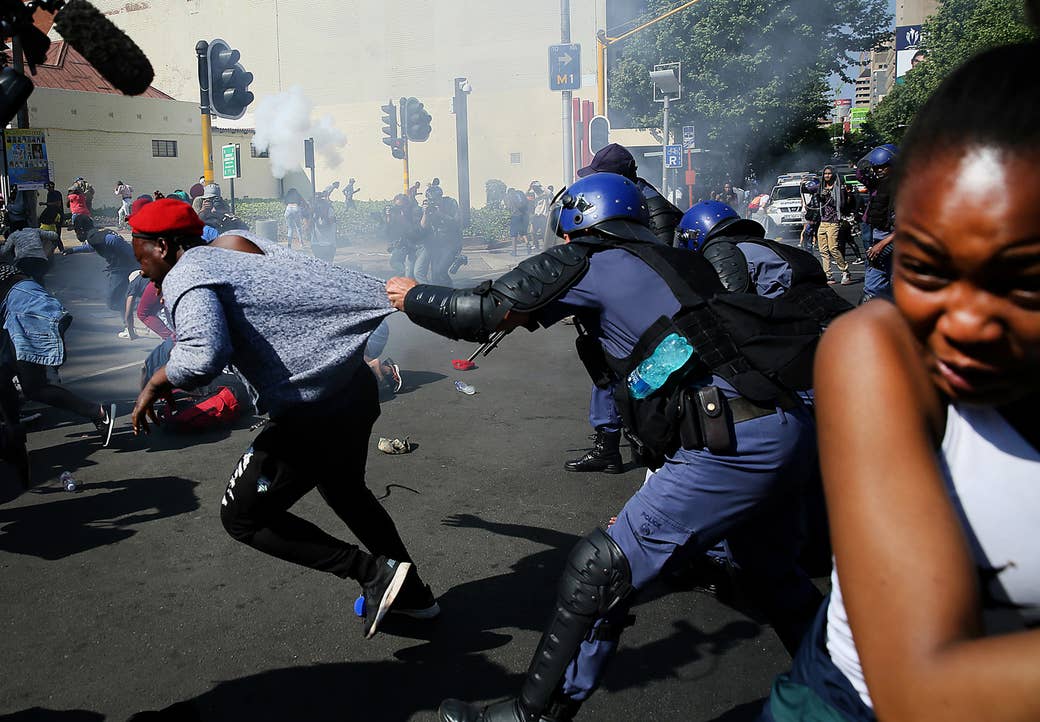
At 22 years old, Tjie is baby-faced and doe-eyed, with a voice that remains soft even when he’s talking about crushing experiences — which, three years into life at Wits, is often.
This was supposed to be a new world, one in which his parents need no longer lie awake in their corrugated iron–roofed home feeling that, no matter how hard they try, it will never be enough for their son. Tjie, at least, out of their four children, had made it out of the townships. But reality quickly began to chip away at this mirage.
Which is why he sometimes avoids his parents when they call him from home. He doesn't know how to explain to them that daily he’s reminded of the fact he is temporarily inhabiting a space that was never meant for people like him — not just black, but poor too — and that, as a result, he constantly feels like he’s there on borrowed time.
There were the gut-wrenching moments that confront every black person. Like the October afternoon when the police had pelted him and other protesters with tear gas, and he’d rushed to shelter in another building. Two white students dashed in ahead of him. When he reached the entrance to safety, Tjie realized a man was blocking his way.
“Where’s your student card?” he recalled the man asking him.
He hadn’t asked the white students.
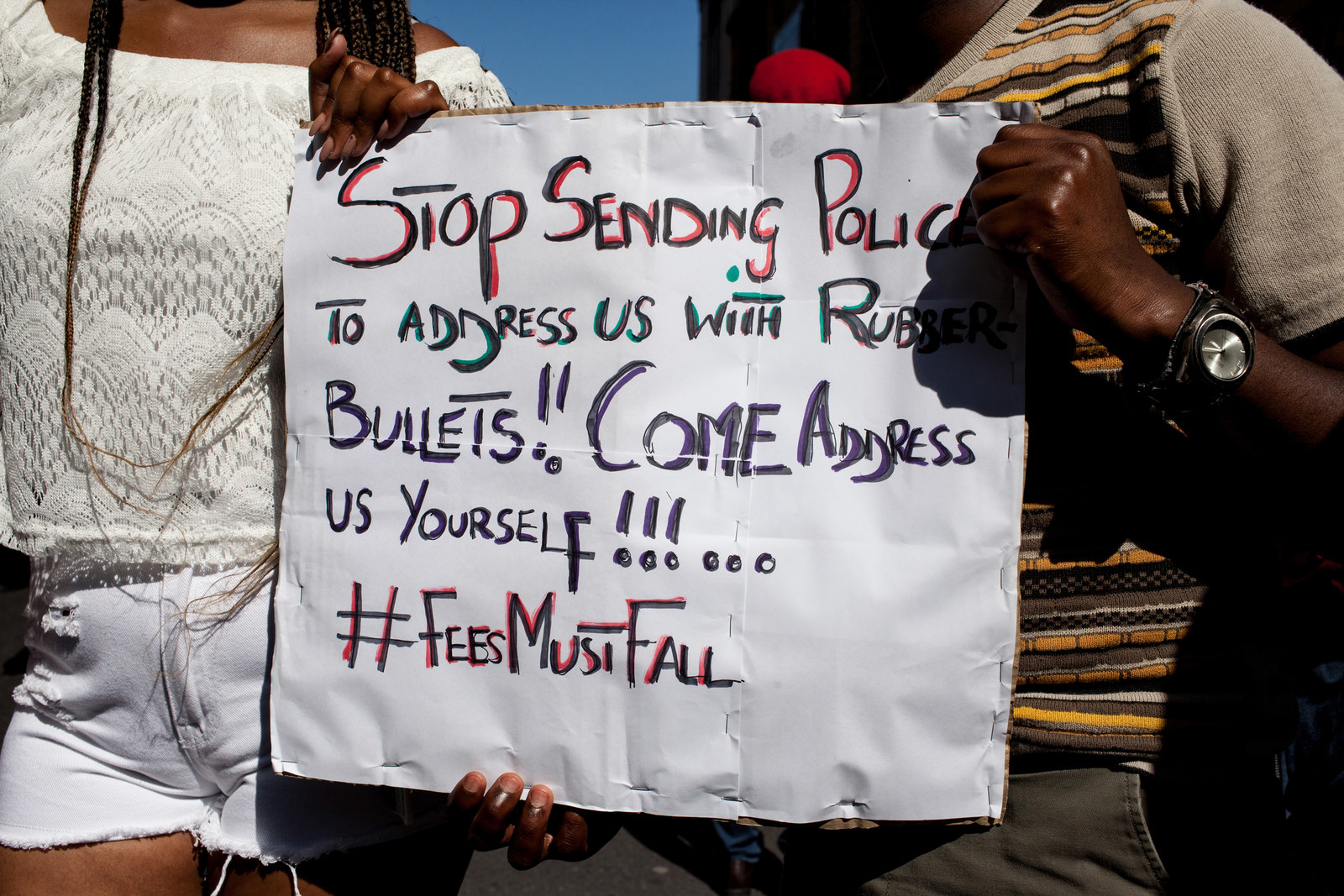
What shook him even more was when he recognized the man as a lecturer.
Later, reflecting on it, Tjie spoke with a resigned calm. “White people aren’t seen as part of this thing, as dangerous.”
When he first arrived at college, Tjie’s Facebook posts were peppered with references to being a “proud Witsie.” Outwardly, he knew it was a monumental achievement for someone who’d clawed their way through rural poverty and a broken public school system. But self-doubt was a constant internal soundtrack. He felt more at home joking around with the university cleaners — “They're our parents,” he said of them — than with most of his fellow students.
He knew what it was like to wake up with stomach cramps from hunger, because he couldn't afford a fridge and was often too tired to cook; his classmates were more likely to be fretting about morning rush-hour traffic. “Our situations,” he said of the latter, “are too different — you can’t compare two things that aren’t even the same.”
As he struggled through his first year, he found camaraderie in a group of black activists marching against the high price of university accommodation. Here were people who saw the world through the same eyes. If you’re born into a black household — as 80% of South Africans are — your average income is six times lower than that of a white household, meaning student fees of up to 108,000 rand ($7,922) disproportionately affect families like Tjie’s.
And, more than once, he’d thought of quitting university altogether — which some 50% of black students do in their first year. “When I first came to Wits, I almost dropped out and ran away home. You write the tests. You try by all means. But the struggle never ends.”
But his family back home was looking up to and depending on him. His elder sister, a graduate unable to find a job. His brother, who had not dared rack up the debt university would bring. His father, who'd come out of retirement to help scrape together money for his fees.
And he’d had high hopes himself. He’d grown up in Mpumalanga, in a farming community that also provided a steady stream of cheap labor to nearby luxury safari parks. As a kid he’d idolized his uncle who was a traffic cop. “He would drive, like, a better car. That’s what I saw each and every day, him living a better life.”
Education was his ticket to one day owning a car, to having money to help out his family. He'd staked everything on it. “I need to do better for my family because they’re all looking to me,” said Tjie.
“My friend yesterday had two rubber bullets. One next to the eye, and one in the leg. How am I gonna concentrate?”
Wits ripped him from the quiet rural life he’d always known and plunged him into the ever-hungry mouth of capitalism in Johannesburg. It was there he began to see clearly how the world worked, starting with the realization that his uncle, the cop who drove a battered car, wasn’t really such a big somebody. “When I came here I realized that no, that’s not life.”
He learned that a school uniform had been a blessing if all the clothes you had barely filled a tiny wardrobe. “Saturday, you’re happy you don’t even come to campus, and study in the room because they will see you wearing exactly the same thing.”
At Wits, he learned how to type properly for the first time.
And he learned that dreams were scaled firstly according to the colour of your skin, then the size of your bank account. “Growing up in Mpumalanga, the people you see who are successful are teachers, nurses. They drive when I walk every day — and you think that’s success. But when you come here you see white people,” he said, then sucked in air and held it for a long moment.
Somewhere along the way, everything became overwhelming; self-doubt morphed into self-sabotage. Adopting a phrase in Tswana, his language, as a mantra — ku rila a swi pfuni, which means, “crying doesn’t help” — he said he saw no point in asking his lecturers for help.
His grades began to slip, and with them the possibility of renewing a scholarship that depended on him getting at least 60% pass marks.
What needled him most, though, were the casual, everyday incidents he couldn’t quite pin down to his skin color, but neither could he shake off the feeling that’s what they were about. Like in class, after pairing up with white students. “After submitting a project or whatever, you don’t know each other any more. Tomorrow, hey—,” he mimed waving at someone, “they take out their phones to try and pretend they didn’t see you.”
For Tjie, who grew up in an all-black township, navigating race was an exhausting, constant undertow.
It came as a painful shock when the university insisted on preparing for exams in November even as protests raged around them. What he was fighting for, he realized, was abstract to most of his white peers. “My friend yesterday had two rubber bullets. One next to the eye, and one in the leg. How am I gonna concentrate?” he asked.
Then when he went to classes, feeling depressed, a white lecturer encouraged students to “take back Wits” from those who were protesting. “He said ‘take back.’ What does ‘take back’ mean? It means you owned it, right? It’s like we stole the thing away so they’re taking it back because it’s theirs.”
And it was the reason he stopped reading newspapers or online news. “You try by all means, but as a black protester, you’re still a hooligan. The media just keeps saying we’re hooligans.”
A few hours after we first spoke, Tjie sent me a message. He thanked me, politely, for talking to him. Since then, though, he’d been pacing around. “After the conversation we had, I had so much anger and I know it will not change the situation,” he wrote. He wouldn’t be able to talk with me again. Each minute of an interview with me meant twice that long dwelling on his painful reality later.
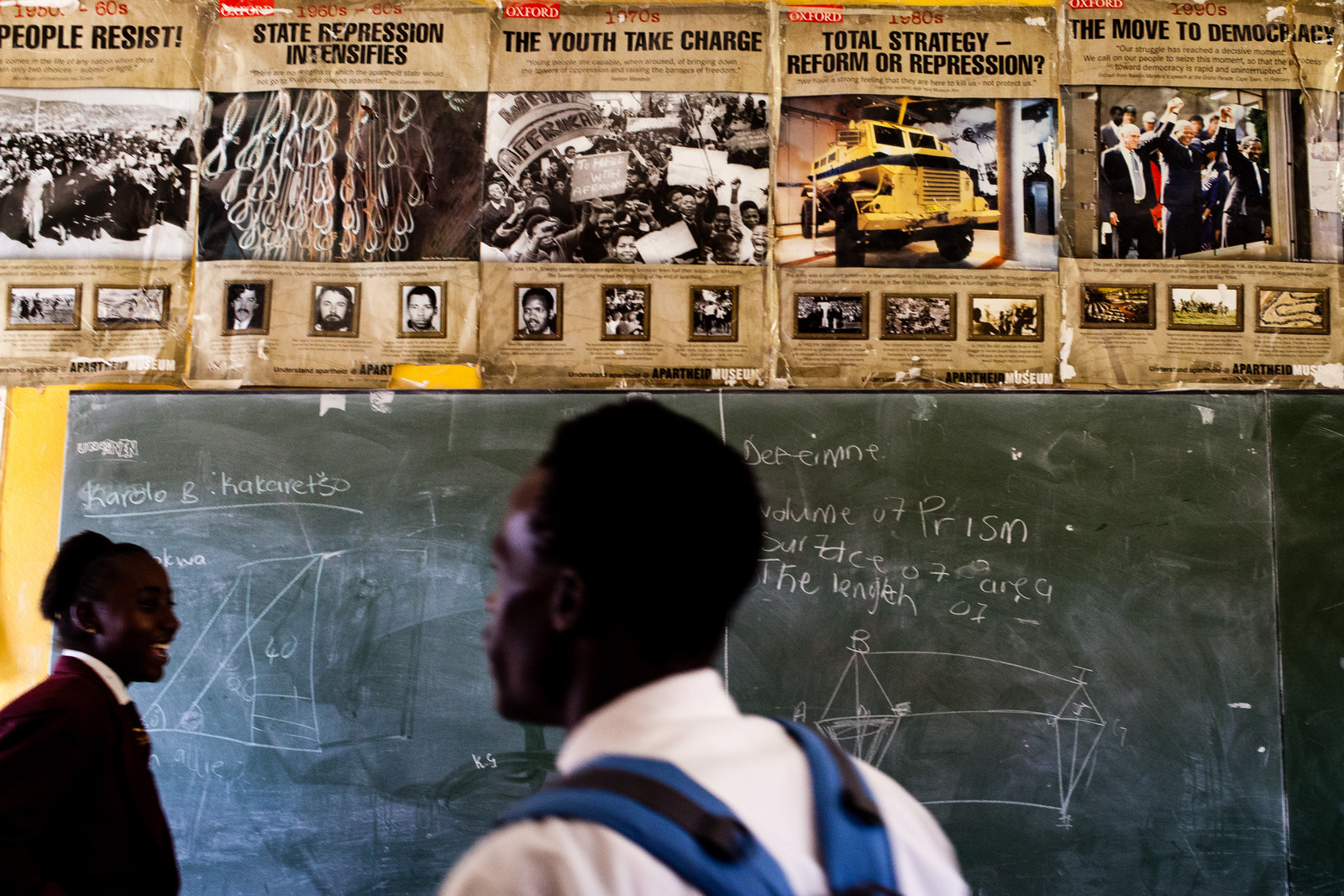
It wasn’t supposed to be this way. Hopes had been so high when the country became a non-racial democracy that those born after the end of apartheid in 1994 were given a nickname full of promise: the born-frees.
Even now it’s hard to conjure the full horrors of apartheid.
Segregation had long existed in colonial South Africa, but in 1948 the all-white National Party enacted a system designed to keep nonwhite throats under white boots. Apartheid, the law of the land, was the separation of races — divided into whites, blacks, Indians, and “coloreds” (members of South Africa’s unique mixed-race heritage). A person’s political, civil, and economic rights — or lack thereof — were dependent wholly on which classification they fell into.
Divide and rule was used to devastating effect. The infamous pencil test — whether someone’s hair was curly or “black” enough to hold a pencil — was so arbitrary and imprecise it meant members of the same family could be forced apart. Some colored people sought to “go white” to improve their own lot in life — at the cost of being unable to see or talk to family or friends who weren’t willing or able to make the leap.
Literally meaning “apart-hood” in Afrikaans, apartheid went even further than the deprivations of Jim Crow in the US. Not unlike the far-right groups ascending in the US today, there was a yearning for a “pure” white nation. Black South Africans were effectively stripped of citizenship and forcibly sent to “Bantustans” — black homelands — so the government could achieve a white majority in “true” South Africa, the almost 90% of land reserved for the white minority. Nonwhites had to carry passes at all times, which determined where they could move around.
Grand apartheid dictated that black people were penned into townships, allowed to enter white areas for labor and domestic work only on designated buses. Petty apartheid was the sign that greeted workers, on return to their townships, saying, “CAUTION: BEWARE OF NATIVES.”
A few years after instituting apartheid, the government gave up the pretense that separate facilities had to be equal, and passed a law to that effect. The result: Inferior black-only buses took black students to inferior black-only schools. Inferior black-only ambulances took black patients to inferior black-only hospitals, and when black people died after receiving inferior treatment, they were buried in inferior black-only cemeteries. Toilets, swimming pools, bars, restaurants, churches, bridges, cinemas, beaches, parks, benches, railway cars, drinking fountains — all were separate and unequal.
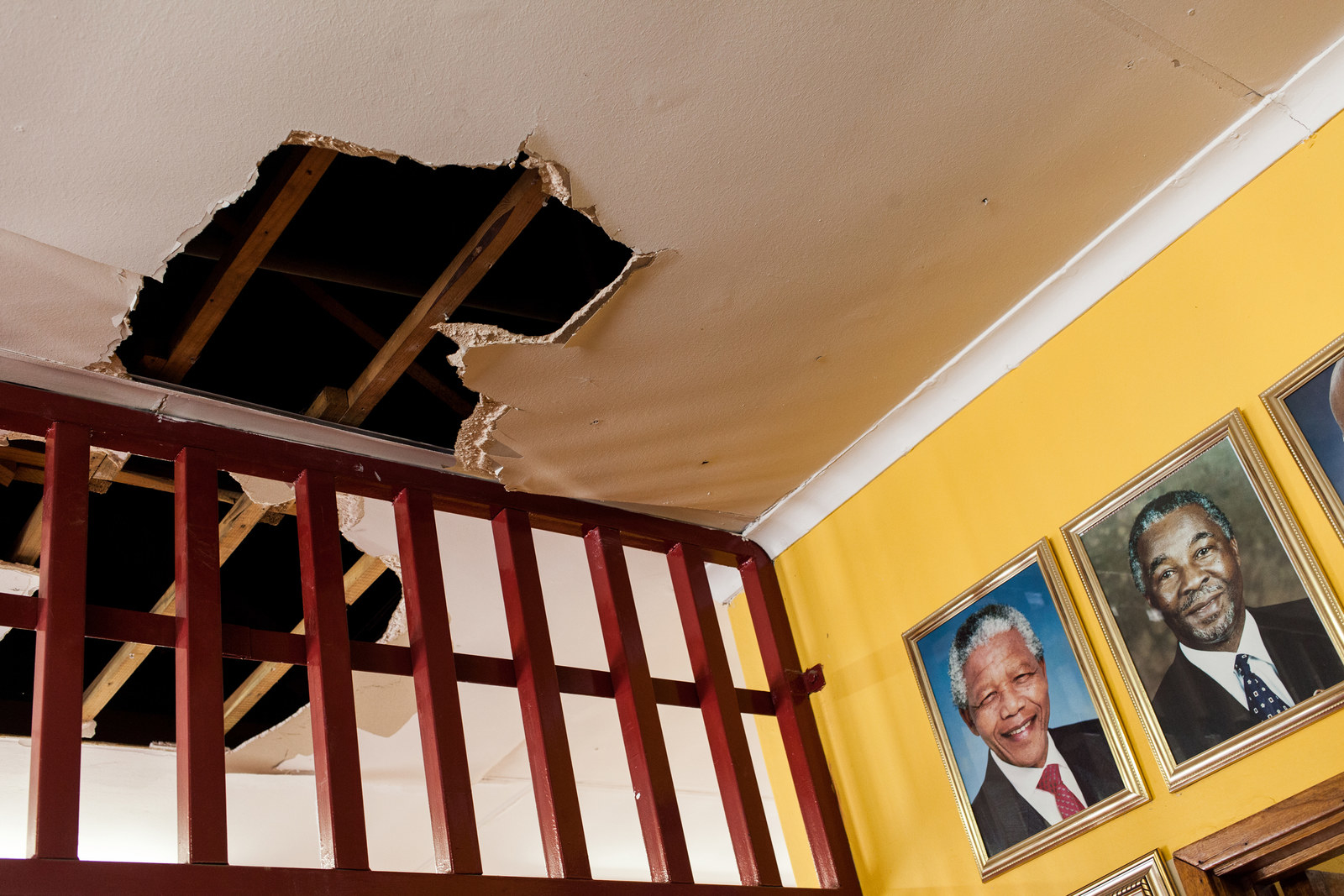
Throughout the 1980s, apartheid began crumbling in the face of black resistance and pressure from international allies of Nelson Mandela and the anti-apartheid movement. “Free Mandela” became an international rallying cry, and in 1990, after his release from prison, he gave a speech that resonates more than ever today. “Apartheid education is inferior and a crime against humanity,” he said, a reference to the then-government’s belief that black people needed only enough education to become domestic helps or manual laborers.
As a lifelong champion of education, the African National Congress (ANC) he led swept to power on a mandate of “jobs, jobs, jobs” and “quality education for all.” The ANC has governed ever since, but increasingly the legacy of moderates like Mandela is being questioned. Millions of impoverished black families have been lifted from poverty, but South Africa’s wealth is still overwhelmingly in the hands of white people, who account for less than 10% of the population. A black empowerment scheme by the ANC focused on shifting wealth from white people into the hands of black entrepreneurs, but in doing so created a class of politically connected oligarchs while failing to address the poverty of most black South Africans that’s a legacy of apartheid.
“Saying apartheid has fallen, we now have black students [at Wits] — that’s a very narrow way of trying to understand the problem,” said Crispen Chinguno, one of just 20% of black academics at Wits. “The political side, we’ve managed — the ANC is now in power — but the economic dimension is heavily in the hands of white monopoly capital. And those who have economic power are able to capture those with political power.”
The algebra of history may now means it’s black police shooting at black students, but it’s dredged up what psychologists call intergenerational trauma; the pain of apartheid is being psychologically relived by a generation who never endured it directly.
“I don’t want to equate this to apartheid because it’s not the same, but we’re dealing with the unfinished business of apartheid,” said Nomfundo Mogapi, director of the Centre for the Study of Violence and Reconciliation, who herself graduated from Wits at a time when it was legally segregated. “If you come from a society where you were made to feel subhuman and stripped of dignity, and those issues haven’t been dealt with, when you experience it in the present it takes you back to the past.”
On the surface, the aims of the Fallists are simple: free and decolonized education, and an end to exploitative outsourcing of support staff like technicians and cleaners, who are almost always black.
But wrapped in the students’ economic demands is a painful reckoning of what it means to be young, educated, and black in a country still stratified by race.
The chasm opens long before university: 47% of white matriculants will go to university; for colored students the number drops to 20%; black students trail with a 17% enrolment rate.
That means many students run a marathon just to reach the starting line at university. Seen this way, the university crisis isn’t just about financing — it’s about who even has a shot at getting there.
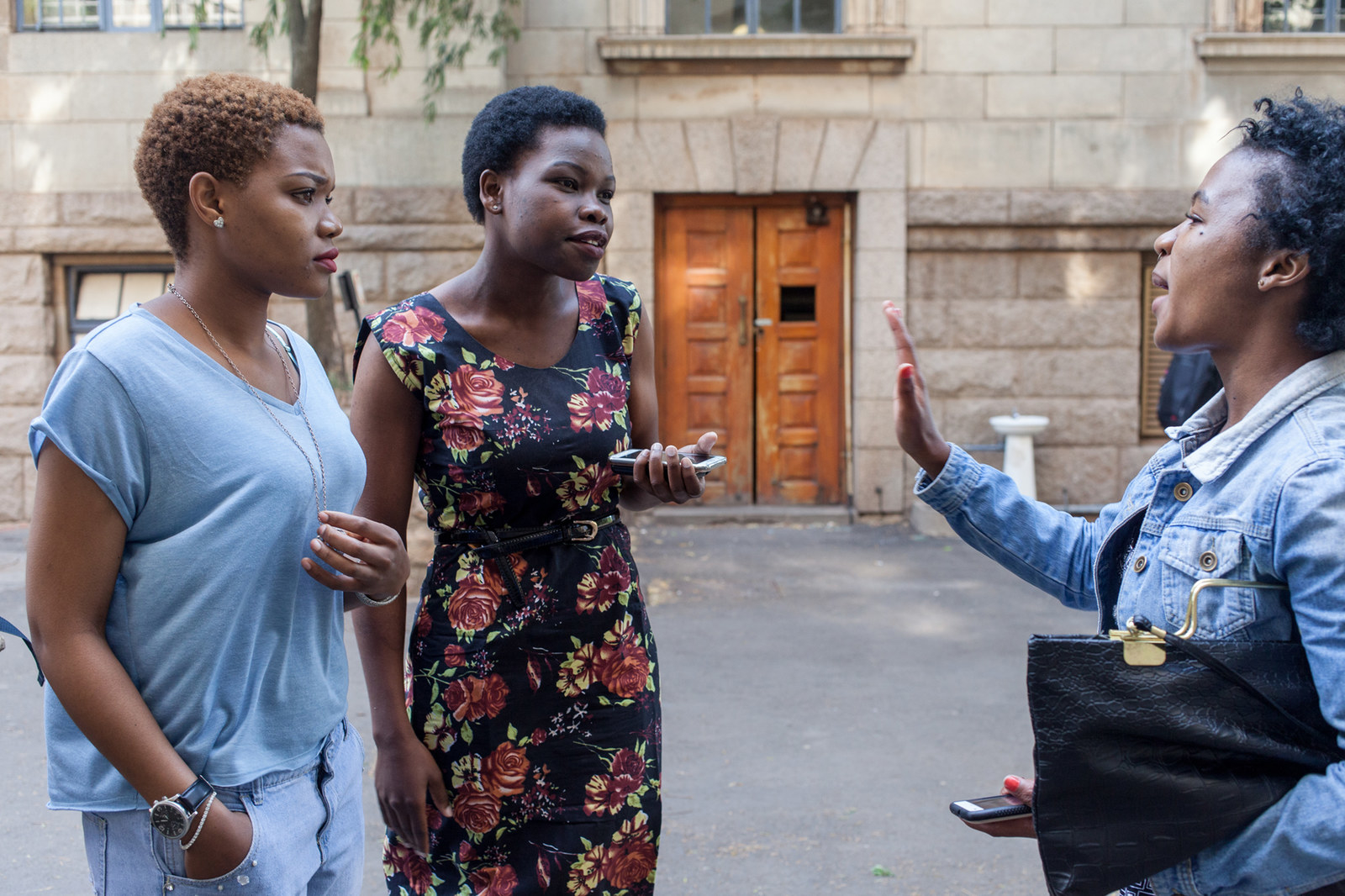
In October last year, I went to a cafe in an art gallery on the Wits campus to meet Kayleen Morgan, a confident, cherub-faced media studies student who is, in South African parlance, colored. She’s also part of the country’s rapidly growing middle class — the so-called Black Diamonds. Although her family could afford the fees, it was at Wits that she woke up to the political reality of being black.
“I started realizing that, next year, certain people I’m sitting in class with — next year I’m gonna walk on a podium, and I’m gonna graduate. And they’re not. Because of the inequality of our society,” she said, shaking her head slowly. “Someone who is 27 is still an undergrad because last year they had to fall out and raise money for a year. And the same thing is going to happen to them at the end of this year again.”
Morgan had attended almost every protest until a few days previously, when riot police closed in on a group of female friends and dragged them off by the hair; the sight of cops now made her break into a sweat.
At Morgan’s middle-class high school, where most of her classmates were also colored or black, race hadn’t been an issue. Instead it was at Wits, where nonwhite enrolment had climbed from from just two students in the late ’60s to 70% of 35,000-odd students today, she was forced to confront it.
“During Fees Must Fall I … realized there isn’t much of a difference between myself and a child that classifies as black in the country,” Morgan explained. “When you’re privileged it’s easier to identify with your white side because you have similar experiences.”
Until then, Morgan never presented any challenge to the white status quo — she spoke with a soft accent, she lived in the suburbs, she got good grades from a good school. All that, she’d felt, would counter what many white people perceived as blackness — which she had herself neither rejected nor fully embraced. “You’re always assimilating as a black child. In high school, you’re taught what to think, not how to think. If you dared challenge anything…” she shook her head so her halo of curls shivered.
“We’re dealing with the unfinished business of apartheid.”
Morgan’s friend Mamodibe Ramodibe, all long limbs, cropped hair, and intellectual fire, took a deep breath and pulled her leather jacket tighter as she tried to articulate why so many people seemed unable to grasp the sentiment behind “fuck white people” — a slogan that had caused outrage in some quarters after being repeatedly sprayed across campus buildings.
“Here’s the thing,” Ramodibe said slowly, “it’s not even implicating them [white people personally]. We’re just saying, look, this is the side effect of years of oppression. So we need to break that down, right?
“So white people then start feeling like we’re throwing jabs at them — and we’re not. It bothers me how as a black child in 2016 I still have to explain how there’s something called an inherited disadvantage.”
For a while, Morgan said, she’d tried to engage with her white friends about how it was impossible to separate herself from the wider fate of most black South Africans. She soon stopped bothering.
“For a white woman to tell me that...” she adopted an overbearing tone, “‘I’ve got two jobs — why don’t you guys just get a job and just work harder?’” Her voice rose a notch in frustration. “Because in the first place I cannot get a job. The fact that you have two jobs is an element of privilege.”
Even more exasperating were encounters with other black people who didn’t support the cause. Ramodibe raised her eyebrows at the thought. “There’s...” she started laughing, “There’s two types of black people in South Africa.”
She and Morgan finished the sentence in unison: “The type that supports Fees Must Fall, and the type that doesn’t.”
Then, serious again, Morgan continued, “I also think it’s because some of these people who are much older than we are, they’ve seen police brutality. They’ve accepted the system. So it makes them uncomfortable to see a youth that doesn’t want to stand for that.”
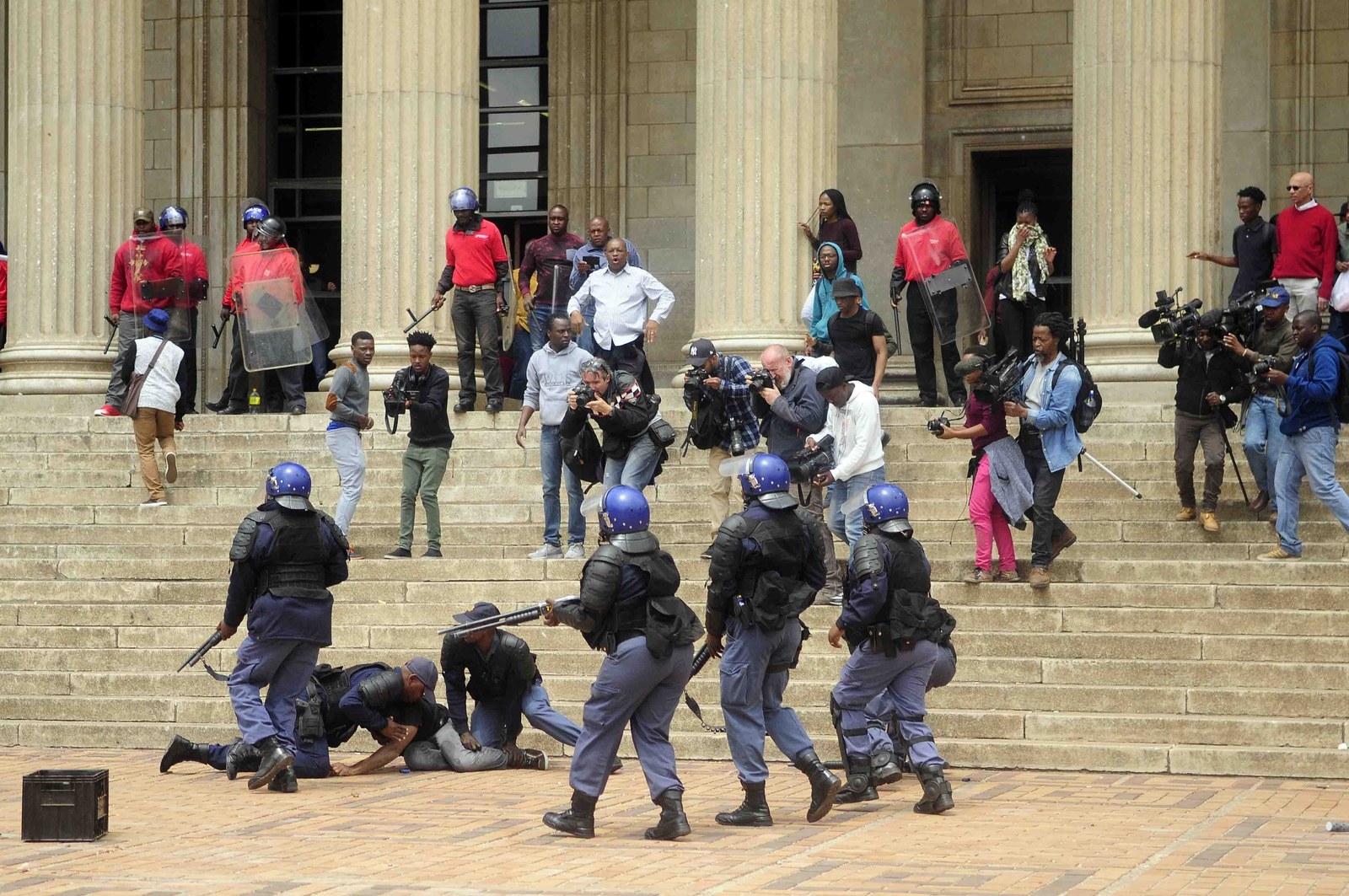
Inside the Great Hall at Wits, where the protesters gathered each day, Glenda Daniels was sitting in her office when two thuds made the windows vibrate. Daniels, a petite South African of Indian descent and senior lecturer at the university’s media studies department, walked out into the corridor, past the sign on her door that read, “UNIVERSITIES IN CRISIS: FUND THEM PROPERLY.”
As more bangs resounded, another colleague ran out his office, glasses askew and face drained of blood.
“Have you heard it? Stun grenades,” he said.
“Stun grenades!” Daniels knew what damage they could do. Thirty years ago, as an undergraduate at Wits, she was one of around 500 nonwhite students who led protests as Wits frequently locked horns with the government over its admissions policies. She later encountered the police again as a reporter during the violence-fueled period leading to the white-minority government’s fall.
She made her way downstairs. Staff were flitting through the hallways.
“Why are you scared? Are you South African or not?” another black member of staff teased, a reference to the protest culture their generation lived through.
“I am South African,” Daniels replied calmly. “I’m scared for my students getting hurt. The stun grenades...”
There was a brief pause.
“This is totally surreal. It just brings back a whole flood of traumatic memories. It feels like running through a surreal nightmare. Unbelievable that 21 years after apartheid fell we have to be dealing with this,” muttered Daniels.
There was the sound of running feet and someone coughing violently. And then the private security who’d been holding the crowd back at the main entrance swept past, holding up their riot shields. Plumes of tear gas filled the corridor.
“When you’re privileged it’s easier to identify with your white side because you have similar experiences.”
An hour later, four lecturers from the media department huddled on a fifth-floor corridor, trapped inside the building as the police faced off with students outside.
“How do they expect us,” Daniels demanded, her voice rising in indignation, “to actually ask our students to come in [to lectures]?”
“How will they get through the tear gas, rubber bullets, water cannons?” another lecturer, Mehita Iqani, said, raising her voice over the roar of a police helicopter outside.
Someone else puzzled over the ages of some of the student leaders — wasn’t one of them 38 years old? Was he even a student?
“Most of them are actually post-grads; they don’t seem to care about the undergrads,” Daniels said.
Nicky Falkof, a white professor who speaks quickly and with a trace of an English accent picked up from years teaching in London, shook her head. “I know a lot of them have got shiny … potential things to do afterwards,” she said.
University campuses have long been used as a springboard into the national arena, and complicated — and sometimes controversial — political ties thread through the movement. Fees Must Fall is supposedly a hierarchy-free movement, but in several meetings I attended students openly complained about the growing number of suspicious about-turns announced by leaders without consultation.
Many see the meddling hands of political parties behind these decisions. “Why do [the government] want to shut down [the protests]? Because the university has produced credible, middle-class, socially mobile people,” someone said.
Daniels interrupted: “Who’ll be less likely to vote the ANC in the future.”
“The radicals are running the show,” another lecturer said.
“So it’s a shitshow,” said another.
Traces of toxins lingered in the air when I returned to the Great Hall to sit in on Falkof’s classes the next day. Five of her 50-odd students made it to class, picking their way past shattered windows and rocks littering the entrance.
Lectures had been intense lately, Falkof explained, walking past empty classrooms. She told a story of one recent class, where a white student had raised her hand and spoken tearfully.
Since the protests, the student said, she’d become acutely aware of slights she’d never noticed her black colleagues having to endure before. In the bookstore where she worked part-time, for example, some white clients would ask her if books were in stock, even after they’d just been told otherwise by her black colleagues. “I feel guilty for being white, I feel like I need to be apologizing for all white people all the time,” the student told Falkof.
Another student, a black woman, then raised her hand. There were tears in her eyes too. “How you’re feeling now? That’s what I’ve felt my whole life.”
And now, the following week, two white women sat in the second row, three black students behind them. Falkof wore a denim jacket, and her curls loose. She sat on the empty front row of the lecture room, trying to coax the class to talk. There was no attempt to study; all anyone could focus on was the crisis playing out.
Someone brought up the police dogs that had been on campus. Falkof said beagles were often used for police work because they’re cute and so people just want to pet them. A smattering of ironic laughter rippled around.
The discussion turned to two images circulating on social media at the culmination of the previous day's chaos: one was of black students leading away a dazed-looking Father Graham, a white campus priest, his robes drenched in blood; the other showed a wild-looking black man hurling rocks at the police.
The pictures set South African social media alight, with users alternately seeing them as evidence to denounce the police or the students.
After the cops began firing rubber bullets in response to students throwing rocks, Graham had opened the doors of the church compound to those fleeing. At some point as the violence dragged on, a police nyala, a heavily armoured van, attempted to charge through the church gate. Graham stood in front of it with outstretched arms. The nyala retreated, but only after police shot Graham in the face.
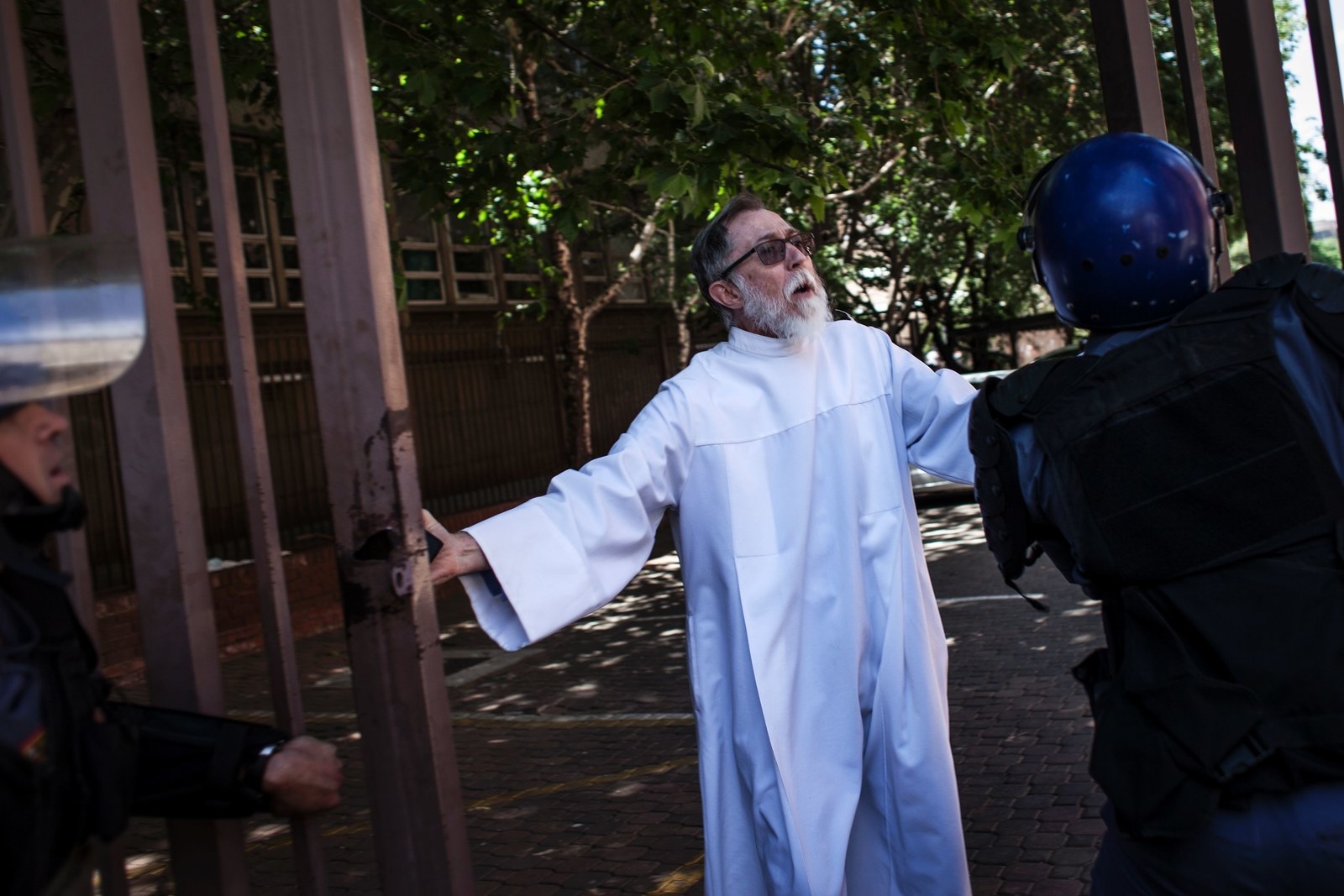
The black man was Wimpy Sello, a homeless 27-year-old who was a regular at the church’s soup kitchen. After seeing Graham shot, he began pelting the armored carrier with rocks.
“People just pick their truths,” said a black student with her hair braided into a neat crown.
Her friend beside her nodded. “That’s why when people say ‘Oh, the students are just hooligans,’ I don’t bother explaining myself anymore,” he said.
A white student put up her hand. What made her angry, she said, was her own relatives who dismissed the movement. She didn’t know how to confront them.
The protests, Falkof theorized, were “one of those moments where the neo-capitalist system starts to fall in on itself. Capitalism, in order to reproduce itself, needs a whole variety of different workers, right? But what it also needs at the same time is for us to keep buying and spending, which means it has to be aspirational and to want to improve and move up a class.”
She paused to see if anyone wanted to comment.
“And by making university so significant, and the only way that you can really progress, we also make them into these really valuable commodities to the extent that people are willing to take a rubber bullet. For this. That’s a hell of a lot of people that are left out of the system where there’s only one path — this — to status and success.”
Nobody had a response.
Looking for answers, I next approached the Black Academics Caucus at Wits. I initially got an unequivocal response: They did not want to speak to journalists because, they said, they didn’t want to be “the token black.” That stance softened once they realized I was black myself.
Wits has only one black South African female professor, and caucus members talk about the “juniorization” of the other black academics who make up roughly a quarter of the staff body: not only the uneven opportunities for promotion, but also what they see as near-constant undermining and micromanaging.
Many within the caucus saw in the students' turmoil a reflection of how their own blackness still shaped their experiences for the worse. “As a black academic you’re in a precarious position,” said one caucus member, speaking on condition of anonymity and explaining, perhaps, why the organization initially trod carefully even as the situation spiraled.
Black lecturers pointed me to an incident that happened at the University of Cape Town. A black professor there brought in members of the Rhodes Must Fall movement to a sociology lecture, where they explained the history of protest songs and their political leanings.
He was immediately chastised for it. “The activists were nothing but walking archives of the struggle to both Africanise and decolonise knowledge in a supposedly South African university in 2015,” wrote Lwazi Lushaba in a fiery open letter after the faculty’s head of department accused him of using lectures to push a political agenda.
Universities like Wits “reject African cultures, African thoughts — the culture itself, the language.”
What hardened the battle lines, many believed, was the growing emphasis on “decolonization” — the idea that African universities can’t just be transplants or extensions of those in former colonial powers. Beyond simply replacing Western, white-washed histories and texts that erase thought systems from places such as Africa or Latin America, it also means universities owning up to their role in perpetuating anti-blackness even today, not least in their alienation of poor black students.
Universities like Wits “reject African cultures, African thoughts — the culture itself, the language, the way that students relate to lecturers,” said Chinguno, the academic who is also a black caucus member there. “It’s much easier for someone to come from Oxford or Cambridge than the black child who comes from the township or the rural area.”
More than once, walking around the manicured grounds with colonnaded buildings that wouldn’t look out of place in Oxford, Chinguno has had students approach him to tell him they’re grateful to have finally encountered a black academic — it gives them hope that they can pursue the same path.
“It’s not that we’re rejecting the world, but the African experience must be at the centre of informing us, not the Eurocentric. Decolonized education is a process that will take hundreds of years, but we need to start somewhere,” added Chinguno, who is half Zimbabwean and half Mozambican, and likes to point out that the fact he nevertheless speaks two South African languages is because of the colonial artificiality of African borders.
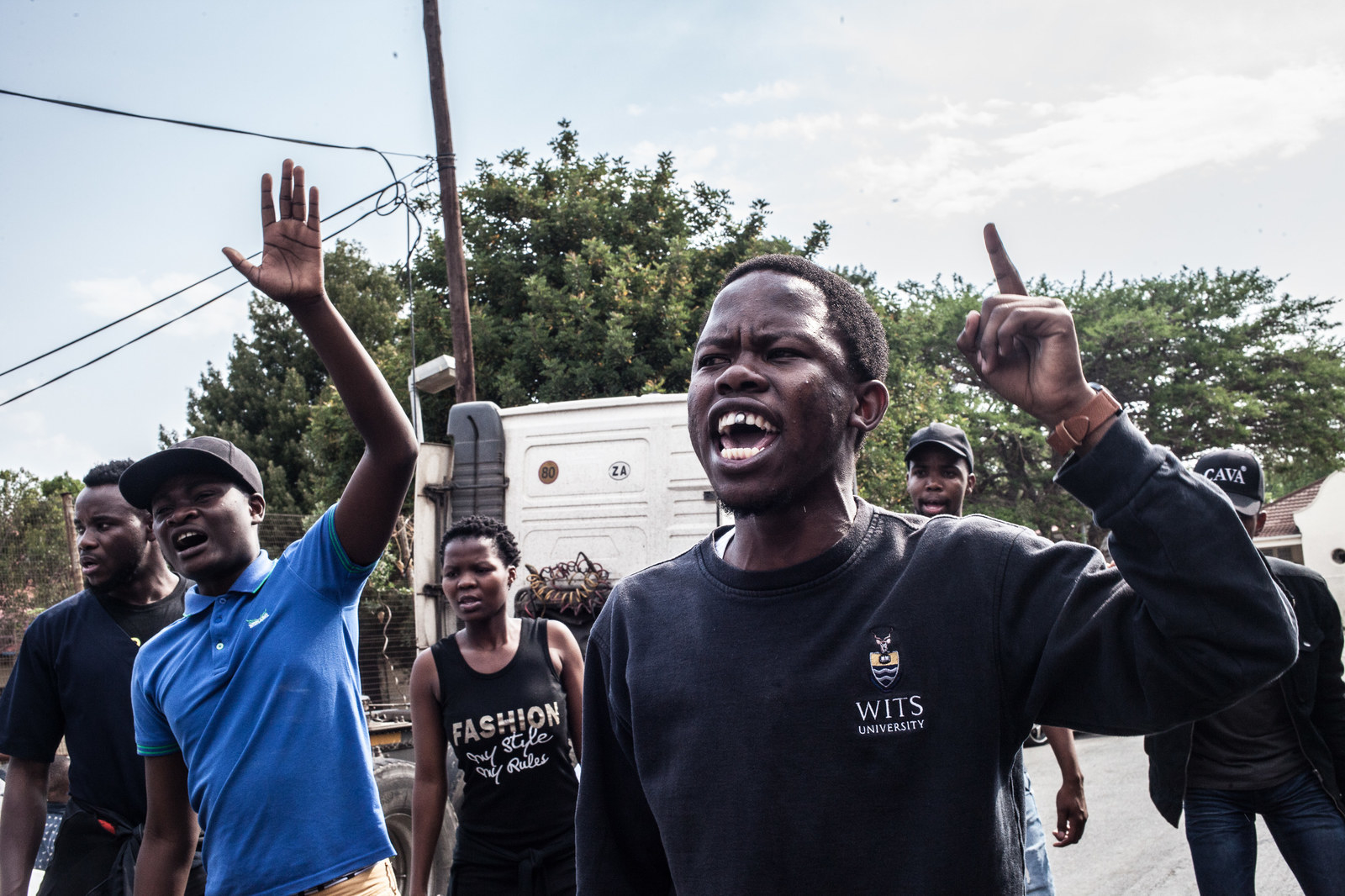
A week after we first met, Tjie sat in his cramped student accommodation in downtown Johannesburg. With time, he’d agreed to talk again.
He wearily admitted that Wits offers him opportunities he wouldn’t otherwise get. The university had, for example, sent him on a week-long induction course at PricewaterhouseCoopers, one of the world’s top global accountancy firms. Afterwards, Tjie was offered a training contract.
In the wake of the year’s violence, he is glad he decided to decline. I asked him if he felt this was the right decision — these kinds of opportunities would be hard to come by, I said.
He shook his head and grimaced at the recollection of his visit there. “The environment — how do I explain it? Maybe it was the way I grew up and everything. I was like, uh oh, I wouldn’t survive here.”
Tjie understands not only that the world does not owe him a living, but also that he may never get another chance. But after a year of violence, protests and missed classes, he was adamant about his decision. “Sometimes you should just let go and lose if you have to.”
He’s not sure what he’ll do next. He’s not sure any other offers will come his way.
By December, all he could do was wait. He was stressed and didn’t sleep well when he took his end-of-year exams. The 24-hour library, where he normally spent the night during exams, closed early because of the protests.
He returned home unsure he’d passed. When the news came that fees would increase by 8% in 2017, he felt a strange sense of relief. There was no way he’d be able to afford the 8,000 extra rand anyway ($922), even if he did pass. A decision had been made for him.
On December 19, he received his grades. He’d got only 50% in one module. But good grades in other modules pulled him up. “Permitted to proceed,” the letter finished.
“I will have to find a way to make it through just one more year,” he said when I spoke to him on the phone, after he got the news.
As the new semester began this year, with police once again stationed on campus, he stopped attending the daily meetings where students strategized for how to take on the establishment and government. Once at the front of daily protests, he has no plans to join any this year.
“This is just a game to them, and if you try to expose them, they're the law,” he said. “I just hope nothing happens this year since we are tired of being shot at for nothing.”
Meanwhile the police said they were ready to handle any further protests using the same tactics as last year. “We will be better positioned to deal with them,” the acting police chief told journalists in January.
Tjie went quiet for a moment as he thought about the future. He felt certain of only one thing: “Protesting won’t get us anywhere.” ●
Outside Your Bubble is a BuzzFeed News effort to bring you a diversity of thought and opinion from around the internet. If you don’t see your viewpoint represented, contact the curator at bubble@buzzfeed.com. Click here for more on Outside Your Bubble.

